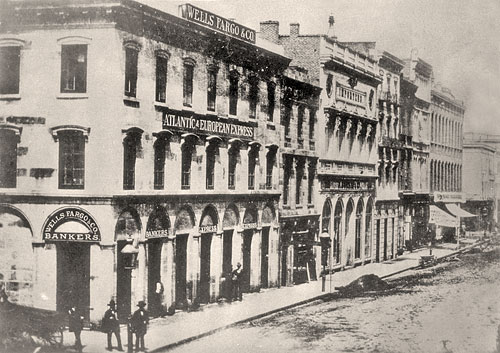Today in Labor History June 8, 1852: The earliest recorded strike by Chinese immigrants occurred when Chinese laborers demanded a raise while working on the Parrott granite building in San Francisco.
1870s
Today in Writing History June 8, 1876 – George Sand, French author and playwright died. She was one of the most popular writers in Europe during her lifetime, even more famous than Victor Hugo or Honoré de Balzac. She was one of several 19th-century women to publicly dress in male attire, even though it was against the law without a special permit. Sand refused to obtain the permit. She found men’s attire cheaper, sturdier and more comfortable. Furthermore, it provided social camouflage that allowed her to move more freely through the Parisian streets than her female contemporaries. She also scandalized French society by smoking in public.
Her politics were nominally left, or oppositional. She participated the provisional government after the 1848 uprising and wrote a number of provocative manifestos. And she helped negotiate pardons for many of the rebels imprisoned by Louis-Napoleon Bonaparte. However, during the Paris Commune of 1871, she urged the government to take violent action against the rebels.
1900s-1910s
Today in Labor History June 8, 1904: A battle between the Colorado state militia and striking miners occurred in Dunnville, Colorado. As a result, six union members died and 15 were taken prisoner. The authorities deported 79 of the strikers to Kansas. Most of this was done under the auspices of Rockefeller, who effectively owned the state government and militia.
Today in Labor History June 8, 1913: An IWW Timber General Strike expanded to over fifty timber camps, employing over five thousand loggers.
Frank Little and the Speculator Mine Disaster
Today in Labor History June 8, 1917: The Granite Mountain/Speculator Mine disaster killed 168 men in Butte, Montana. It was the deadliest underground mine disaster in U.S. history. Within days, men were walking out of the copper mines all over Butte in protest of the dangerous working conditions. Two weeks later, organizers had created a new union, the Metal Mine Workers’ Union. They immediately petitioned Anaconda, the largest of the mine companies, for union recognition, wage increases and better safety conditions. By the end of June, electricians, boilermakers, blacksmiths and other metal tradesmen had walked off the job in solidarity.
Frank Little
Frank Little, a Cherokee miner and member of the IWW, went to Butte during this strike to help organize the miners. Little had previously helped organize oil workers, timber workers and migrant farm workers in California. He had participated in free speech fights in Missoula, Spokane and Fresno, and helped pioneer many of the passive resistance techniques later used by the Civil Rights movement. He was also an anti-war activist, calling U.S. soldiers “Uncle Sam’s scabs in uniforms.” On August 1, 1917, vigilantes broke into the boarding house where he was staying. They dragged him through the streets while tied to the back of a car and then hanged him from a railroad trestle.
Author Dashiell Hammett had been working in Butte at the time as a striker breaker for the Pinkerton Detective Agency. They had tried to get him to murder Little, offering him $5,000, but he refused. He later wrote about the experience in his novel, “Red Harvest.” It supposedly haunted him throughout his life that anyone would think he would do such a thing.
1940s
Today in Labor History June 8, 1942: Spanish anarchist and Durrutti Column member José Pellicer-Gandia (1912-1942) was executed following a fascist military tribunal.
Today in Labor History June 8, 1949: Helen Keller, Dorothy Parker, Danny Kaye, Fredric March, Edward G. Robinson and others were named as Communist Party members in an FBI report.
Today in Writing History June 8, 1949: George Orwell’s “Nineteen Eighty-Four” was published.
1960s
Today in Labor History June 8, 1966: 35,000 members of the Machinists union began a 43-day strike, the largest in airline history. The strike shut down 60% of airline travel.
Today in Labor History June 8, 1967: Israel attacked the United States and got away with it. Israeli aircraft and boats attacked the USS Liberty during Israel’s “Six Day War,” killing 34 U.S. sailors and wounded 171. The U.S. government “investigated” the attack and issued a whitewashed report calling it an unfortunate mistake. However, witnesses and critics dispute this claim, calling it a deliberate attack by Israel to silence U.S. criticism of Israel’s war tactics. According to George Ball, undersecretary of state at the time, the attack set the stage for future Israeli policy by sending the message to Israel’s leaders “that nothing they might do would offend the Americans to the point of reprisal. If America’s leaders did not have the courage to punish Israel for the blatant murder of American citizens, it seemed clear that their American friends would let them get away with almost anything.”
1970s
Today in Labor History June 8, 1971: New York City drawbridge tenders, in a dispute with the state over pension issues, left a dozen bridges open. The Daily News described it as “the biggest traffic snafu in the city’s history.” 500 water department workers also walked out. It was illegal at the time to have U.S. soldiers act as replacement workers, so they used the Army Corps of Engineers as “advisers” to the civilian scabs. However, even with the “aid” of the military personnel, they couldn’t operate the bridges because key parts “had gone missing.”








Pingback: Today in Labor History June 10 - Marshall Law
Pingback: Today in Labor History August 1 - Marshall Law